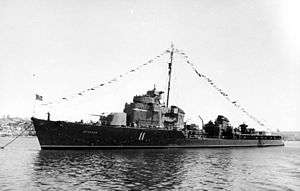Ognevoy-class destroyer
 The destroyer Ognevoy | |
| Class overview | |
|---|---|
| Name: | Ognevoy class (Project 30) |
| Operators: |
|
| Preceded by: | Soobrazitelnyy-class |
| Succeeded by: | Skoryy-class |
| Built: | 1938-48 |
| In service: | 1944-1960 |
| Planned: | 24 |
| Completed: | 11 |
| Cancelled: | 13 |
| Retired: | 11 |
| General characteristics | |
| Type: | Destroyer |
| Displacement: |
|
| Length: | 117 m (383 ft 10 in) |
| Beam: | 11.6 m (38 ft 1 in) |
| Draught: | 4.2 m (13 ft 9 in) |
| Propulsion: | 2 shaft geared turbines, 3 boilers 60,000 hp (45,000 kW) |
| Speed: | 37 kn (69 km/h; 43 mph) |
| Range: | 1,700 nmi (3,100 km; 2,000 mi) at 16 kn (30 km/h; 18 mph) |
| Complement: | 250 |
| Armament: | |
The Ognevoy-class destroyers were a series of destroyers built for the Soviet Navy during and immediately after World War II. The Soviet designation was Project 30 and Project 30K.
The Type 7 destroyers proved to have a less than adequate seaworthiness for Soviet conditions. The Soviets decided to build a larger ship with main armament in enclosed turrets. These ships proved popular with the Soviet Navy and formed the basis for the post-war Skoryy class or Project 30bis.
Design
The specification (TTZ in Russian) for these ships was issued by the Naval staff in November 1937. The design work was done by Zhdanov Yard in Leningrad under the leadership of A. Yunovidova and approved by the government in 1939.
Hull strength was significantly increased and the hull was enlarged compared to the Project 7 ships. Longitudinal framing was used and hull plating was thicker than the Project 7 ships. Hull height was increased giving extra free board.
The machinery consisted of two boiler rooms and two engine rooms similar to the Project 7U destroyers but in less cramped spaces. Electricity generation capacity was increased to two 100 kW (130 hp) plants and two 50 kW (67 hp) plants. An alternative design Project 30A using super-heated high pressure machinery based on American designs was projected but not built.
The armament was housed in two enclosed splinter-proof and weatherproof turrets in 'A' and 'Y' positions. This was a significant advance over the open mountings used in the Project 7 ships. The B-2LM turrets were introduced in the Tashkent class and proven successful in service but had no anti-aircraft capability. Anti-aircraft armament comprised two 85 mm (3 in) guns in a twin mounting in 'X' position and six 37 mm (1.5 in) guns in single mountings. The ships also carried two sets of quadruple torpedo tubes and 50 mines.
The ships were fitted with air warning, surface search and gunnery control radars and sonar after the war.
Ships
Project 30
24 ships were ordered in 1938-40 but the programme was disrupted by the German Invasion in 1941. The ships being built in Nikolayev were demolished before launch or evacuated incomplete while those built in other yards were suspended for the duration of the conflict.
- Ognevoy (Огневой, Fiery) - built by 61 Kommunar Yard, Nikolayev - hull evacuated to Poti and completed in 1943 the turrets were salvaged from the wreck of a Tashkent-class destroyer. She was scrapped in the 1960s
Project 30K
Some of the intact ships were completed after the war to a modified design (K for korrektirovany - corrected).[1]
| Ship | Fleet | Builder | Completed | Fate |
|---|---|---|---|---|
| Ozornoi (Озорной, Mischievous) | Black Sea Fleet | 61 Kommunar yard, Nikolayev | 1949 | hull evacuated to Poti and completed in 1949, given to the Bulgarian Navy on 25 March 1950 as Georgi Dimitrov, scrapped 1963 |
| Otverzhdyonny (Отверждённый, cast out) | Black Sea Fleet | Sevastapol Navy dockyard | 1947 | Not completed. |
| Osmotritelny (Осмотрительный, Observant) | Baltic Fleet | Ordzhinikidze yard, Leningrad | 1947 | scrapped in the 1960s |
| Otlichny (Отличный, Excellent) | Baltic Fleet | Zhdanov yard, Leningrad | 1947 | scrapped in the 1960s |
| Obraztsovy (Образцовый, Exemplary) | Baltic Fleet | Zhdanov yard, Leningrad | 1948 | scrapped in the 1960s |
| Otvazhny (Отважный, Courageous) | Baltic Fleet | Zhdanov yard, Leningrad | 1948 | scrapped in the 1960s |
| Odaryonny (Одарённый, Gifted) | Baltic Fleet | Zhdanov yard, Leningrad | 1949 | scrapped in the 1960s |
| Stalin (Сталин) | Northern Fleet | Molotovsk Yard (Severodvinsk) | 1949 | scrapped in the 1960s |
| Vnushitelny (Внушительный, Imposing) | Pacific Fleet | Dalzavod Komsomolsk-na-Amure | 1944 | scrapped in the 1960s |
| Vlastny (Властный, Powerful) | Pacific Fleet | Dalzavod Komsomolsk-na-Amure | 1948 | scrapped in the 1960s |
| Vynoslivy (Выносливый, Hardy) | Pacific Fleet | Dalzavod Komsomolsk-na-Amure | 1948 | scrapped in the 1960s |
References
Citations
- ↑ S.S. Berezhnoy (С.С.Бережной): Sovyetskiy VMF 1945-1995. Kreysera, bolshiye protivolodochniye korabli, esmincy (СОВЕТСКИЙ ВМФ 1945-1995. Крейсера, большие противолодочные корабли, эсминцы), Morskaya Kollektsya nr. 1/1995
Sources
- M.J Whitley, Destroyers of World War 2, 1988 Cassell Publishing ISBN 1-85409-521-8
- Gardiner, Robert; Chesneau, Roger (1980). Conway's All the World's Fighting Ships 1922-1946. London: Conway Maritime Press. ISBN 0-83170-303-2.